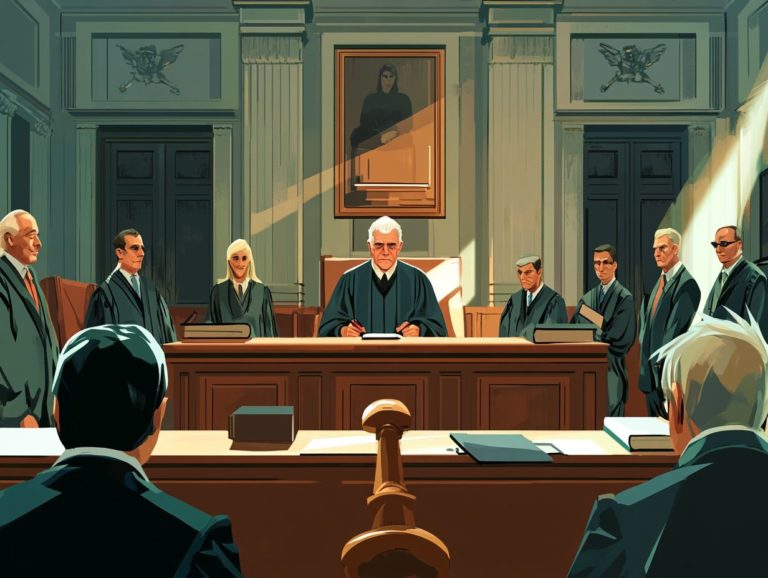How to Handle IP Litigation as a Plaintiff
Intellectual property (IP) litigation can feel like navigating a labyrinth, especially when you’re determined to protect your rights. Ready to dive into the world of IP litigation? This guide is your key to understanding your rights and winning your case!
Grasping the nuances of IP law, recognizing the various types of cases, and understanding the crucial steps to prepare your case can profoundly influence the outcome. This guide delves into the essential elements of IP litigation, from gathering compelling evidence to selecting the right legal representation, mastering the complexities of the court process, and evaluating settlement options. It even covers post-litigation strategies to ensure your intellectual property remains secure moving forward.
Whether you re gearing up for a potential legal battle or simply want to be well-prepared, this comprehensive guide equips you with the vital knowledge you need.
Contents
- Key Takeaways:
- Understanding IP Litigation as a Plaintiff
- Preparing for IP Litigation
- Navigating the Legal Process
- Settlement vs. Trial
- Post-Litigation Strategies
- Frequently Asked Questions
- What is intellectual property litigation and why would I need to handle it as a plaintiff?
- Cu les son los pasos para manejar una demanda de propiedad intelectual como demandante?
- C mo puedo prepararme para una demanda de propiedad intelectual como demandante?
- Cu les son los desaf os comunes en manejar una demanda de propiedad intelectual como demandante?
- Cu les son los resultados potenciales de una demanda de propiedad intelectual como demandante?
- Existen alternativas a una demanda de propiedad intelectual para resolver disputas como demandante?
Key Takeaways:

- Understand the basics of intellectual property law and different types of IP litigation.
- Gather evidence carefully.
- Choose the right legal representation.
- Navigate legal processes and potential challenges.
- Weigh the outcomes of settlement vs. trial.
- Develop post-litigation strategies to protect your IP.
Understanding IP Litigation as a Plaintiff
Grasping IP litigation as a plaintiff requires a deep dive into the intricacies of intellectual property law, which includes patents, copyrights, trademarks, and trade secrets. This legal framework grants exclusive rights to IP holders, enabling them to protect their innovative creations from unauthorized use.
Navigating the landscape of IP litigation involves working through federal rules, engaging in litigation processes, and leveraging legal protections to assert ownership rights and seek damages. Plaintiffs must understand their legal standing and available strategies in the civil court system.
Overview of Intellectual Property Law
Intellectual property law is an essential part of the legal framework that governs the rights and protections available to you as a creator or inventor, ensuring that you retain exclusive rights over your creations and innovations. This legal structure not only shields your inventions and artistic expressions but also cultivates an environment where your creativity and innovation can truly thrive.
By familiarizing yourself with the various types of intellectual property protections like copyrights, trademarks, patents, and trade secrets you can navigate the complexities of ownership rights with confidence. Trade secrets are confidential business information that gives a competitive edge.
Each type serves its unique purpose, ensuring that your hard work and ingenuity are respected and safeguarded against unauthorized use. For you as an IP holder, the consequences of infringement can be substantial, often leading to legal actions that not only defend your rights but also serve as a deterrent to potential violators looking to misappropriate your work.
Types of IP Litigation
The realm of IP litigation offers a variety of avenues, including patent litigation, copyright litigation, trademark litigation, and trade secret litigation. Each targets specific forms of infringement and legal claims.
Patent litigation involves inventions and processes, which usually necessitates expert testimony to back up claims about patent validity and infringement.
Copyright litigation safeguards original works of authorship think music and literature concentrating on reproduction, distribution, and public performance rights.
Trademark litigation revolves around brand identity and aims to eliminate consumer confusion, protecting symbols, names, or slogans that set goods or services apart.
Meanwhile, trade secret litigation targets the unauthorized use of confidential business information, highlighting the necessity of maintaining secrecy.
Each type comes with its own set of unique processes, including filing procedures, discovery, and trial, all of which require civil courts to play a pivotal role in resolving disputes and determining potential damages.
Preparing for IP Litigation
Preparing for IP litigation demands a meticulous strategy that involves not only gathering compelling evidence but also crafting a robust case. It’s essential to select the right legal representation to adeptly navigate the complexities inherent in intellectual property disputes. By taking these steps, you position yourself for a more favorable outcome.
Get started today by reviewing these essential steps and safeguarding your intellectual property!
Gathering Evidence and Building a Case

Gathering evidence is crucial in IP litigation. It lays the groundwork for your legal claims against alleged infringement.
The types of evidence you ll need can vary by case. Typically, they include detailed records like patents, trademarks, or copyrights.
Expert testimony is also vital. Knowledgeable professionals can clarify difficult concepts and enhance your credibility.
Prior art research is another essential element. It demonstrates the uniqueness of your claims compared to existing knowledge in the field.
This evidence illustrates the alleged infringement clearly. It also plays a vital role in calculating damages, strengthening your position in court by providing a robust foundation for your arguments.
Choosing the Right Legal Representation
Finding the right attorney is critical for your success in IP litigation!
Skilled attorneys bring the specialized legal expertise that can dramatically influence the outcome of your case while also helping you manage litigation costs.
When you’re considering attorneys, it s crucial to focus on those who specialize in intellectual property law. They have the nuanced understanding needed to navigate this complex field effectively.
A strong track record of successful litigation is another crucial factor; it demonstrates their ability to advocate for your rights and interests effectively.
Effective legal counsel can streamline the complexities of legal action for you. They offer strategic guidance that enhances your chances of a favorable resolution. Their experience will also enable you to anticipate challenges and craft compelling arguments that validate your claims.
Navigating the legal process in IP litigation requires a deep understanding of court procedures, meticulous preparation for enforcement actions, and the execution of effective litigation strategies.
This is essential for asserting an IP holder’s rights in a civil court setting. Your approach will determine the strength of your case and the protection of your intellectual property.
Key Steps in IP Litigation
The key steps in IP litigation involve filing a civil lawsuit, engaging in discovery, and preparing for trial. Each of these stages necessitates meticulous planning and strict adherence to court procedures.
Discovery Phase
During the discovery phase, both parties exchange pertinent information. Here, the plaintiff aims to build a robust case while the defendant seeks out any weaknesses in the plaintiff’s arguments.
Strategic planning is essential as you, whether as the plaintiff or defendant, navigate through these phases. Initially, if you’re the plaintiff, you’ll need to carefully outline your claims, ensuring that all relevant intellectual property rights are clearly defined. Meanwhile, the defendant prepares to counter these allegations with well-researched defenses.
As the trial approaches, the prospect of settlements can emerge, potentially saving both parties time and resources. Ultimately, whether through a negotiated resolution or a trial verdict, the outcome can profoundly impact the rights and interests of those involved.
Challenges and Potential Outcomes
IP litigation poses serious challenges that demand your immediate attention. You must navigate complex legal arguments and prepare for potential counterclaims.
As a plaintiff, you may find yourself wrestling with intricate rules regarding evidence, the protracted nature of trials, and the considerable financial burden tied to preparation and legal fees. These obstacles can amplify the stress of the process, particularly as defendants may resort to various tactics aimed at prolonging litigation and diminishing your resolve.
The potential outcomes can be quite varied; a favorable judgment might validate your claims and lead to monetary compensation, whereas a settlement could offer a swifter resolution, though possibly at the expense of fully acknowledging your rights.
Alternatively, injunctions can effectively cease infringing activities, but they often invite additional scrutiny and implications for your future business operations.
Stay proactive throughout this process to safeguard your rights!
Settlement vs. Trial

When faced with the choice between settlement and trial in intellectual property (IP) litigation, you encounter a pivotal decision. This choice requires careful consideration.
Each option carries distinct advantages and risks. These factors influence not only the costs of the litigation but also the ultimate outcomes for you as the plaintiff.
Pros and Cons of Each Option
The decision to pursue settlement or take a case to trial involves careful consideration of various factors. These include legal approaches, potential costs, and the likelihood of success in court.
For many intellectual property holders, the choice between settling a dispute and navigating the complexities of a courtroom trial can bring uncertainty.
Settlements often offer quicker resolutions. They can also lead to reduced legal fees, enabling you to conserve resources and prioritize innovation over litigation.
For example, consider a tech startup facing a patent infringement claim. Opting for a settlement might be the prudent choice to avoid a lengthy trial that could deplete its limited finances.
On the other hand, larger corporations might be willing to gamble on going to trial. They may aim to set a significant precedent or secure substantial damages.
A prime example is the clash between Apple and Samsung, where both companies weighed the potential rewards of a trial. This highlights the strategic calculations that underpin these critical decisions.
Post-Litigation Strategies
Post-litigation strategies are crucial for you as a plaintiff. They help you effectively enforce judgments or settlements while protecting your intellectual property from future infringements.
By implementing these strategies, you can ensure that your hard-earned rights and assets remain secure.
Enforcing a Judgment or Settlement
Enforcing a judgment or settlement requires you to understand the legal mechanisms at your disposal as an IP holder. This ensures compliance with settlement agreements and court rulings.
This involves various methods, such as wage garnishment, property liens, and bank levies. Each method is strategically designed to address non-compliance. You might also consider legal actions like pursuing contempt of court motions to compel adherence to agreements.
However, the enforcement process has its challenges. Collecting funds from an individual or entity lacking sufficient assets can be quite difficult.
Therefore, stay alert and ready to defend your rights! Actively monitor the situation while taking proactive measures to protect your interests. Ongoing assessments may reveal changes that require further legal action, allowing you to uphold your rights effectively.
Protecting Your Intellectual Property in the Future
Protecting your intellectual property in the future means grasping the legal frameworks available to you. Implement proactive commercial strategies to stay one step ahead of potential infringement risks.
To effectively safeguard your innovations, prioritize ongoing monitoring of the competitive landscape. Spot possible threats early by setting up alerts for similar products or trademarks. Leverage technology to track any infringements.
Maintaining rigorous legal protections, such as timely renewals of patents and trademarks, keeps your rights enforceable. By fostering a culture of innovation, you can adapt your IP strategies to market changes, enhancing your competitive edge.
Ultimately, a strategic approach to IP rights not only fortifies your existing assets but also lays the groundwork for future growth and protection. Take charge of your IP rights today!
Frequently Asked Questions

What is intellectual property litigation and why would I need to handle it as a plaintiff?
Intellectual property litigation refers to the legal process of resolving disputes related to intellectual property rights, such as patents, trademarks, and copyrights. As a plaintiff, you may need to handle intellectual property litigation if someone has infringed your rights and you wish to take legal action to protect them.
Cu les son los pasos para manejar una demanda de propiedad intelectual como demandante?
El primer paso es consultar con un abogado experto en propiedad intelectual para evaluar la solidez de su reclamaci n.
Si determinan que tiene un caso v lido, lo ayudar n a presentar una queja ante el tribunal correspondiente.
A partir de ah , el proceso puede incluir descubrimientos, mociones previas al juicio y, eventualmente, un juicio o negociaciones de acuerdo.
C mo puedo prepararme para una demanda de propiedad intelectual como demandante?
La clave para prepararse es recopilar tanta evidencia y documentaci n como sea posible para respaldar su reclamaci n.
Esto puede incluir patentes, marcas registradas, derechos de autor y cualquier otra documentaci n relevante.
Tambi n es fundamental tener una comprensi n clara de sus objetivos y el resultado que desea en el caso.
Cu les son los desaf os comunes en manejar una demanda de propiedad intelectual como demandante?
Uno de los principales desaf os es la complejidad de las leyes de propiedad intelectual y la necesidad de experiencia especializada.
Adem s, puede ser un proceso prolongado y costoso, por lo que debe evaluar los riesgos y beneficios antes de continuar.
Tambi n puede enfrentar dificultades para recopilar evidencia o probar da os.
Cu les son los resultados potenciales de una demanda de propiedad intelectual como demandante?
Imagina si ganas! Podr as obtener una compensaci n que cambie las reglas del juego, adem s de medidas cautelares para detener a la parte infractora de usar tu propiedad intelectual.
Sin embargo, siempre existe la posibilidad de perder el caso, por lo que es crucial evaluar los riesgos y beneficios.
Existen alternativas a una demanda de propiedad intelectual para resolver disputas como demandante?
S , existen m todos alternativos de resoluci n de disputas, como la mediaci n, un proceso donde un tercero ayuda a las partes a llegar a un acuerdo, y el arbitraje, donde un tercero toma una decisi n vinculante sobre la disputa.
Estos m todos pueden ser m s rentables y eficientes que la demanda tradicional, pero no siempre son apropiados o exitosos, por lo que es mejor discutir sus opciones con un abogado.






